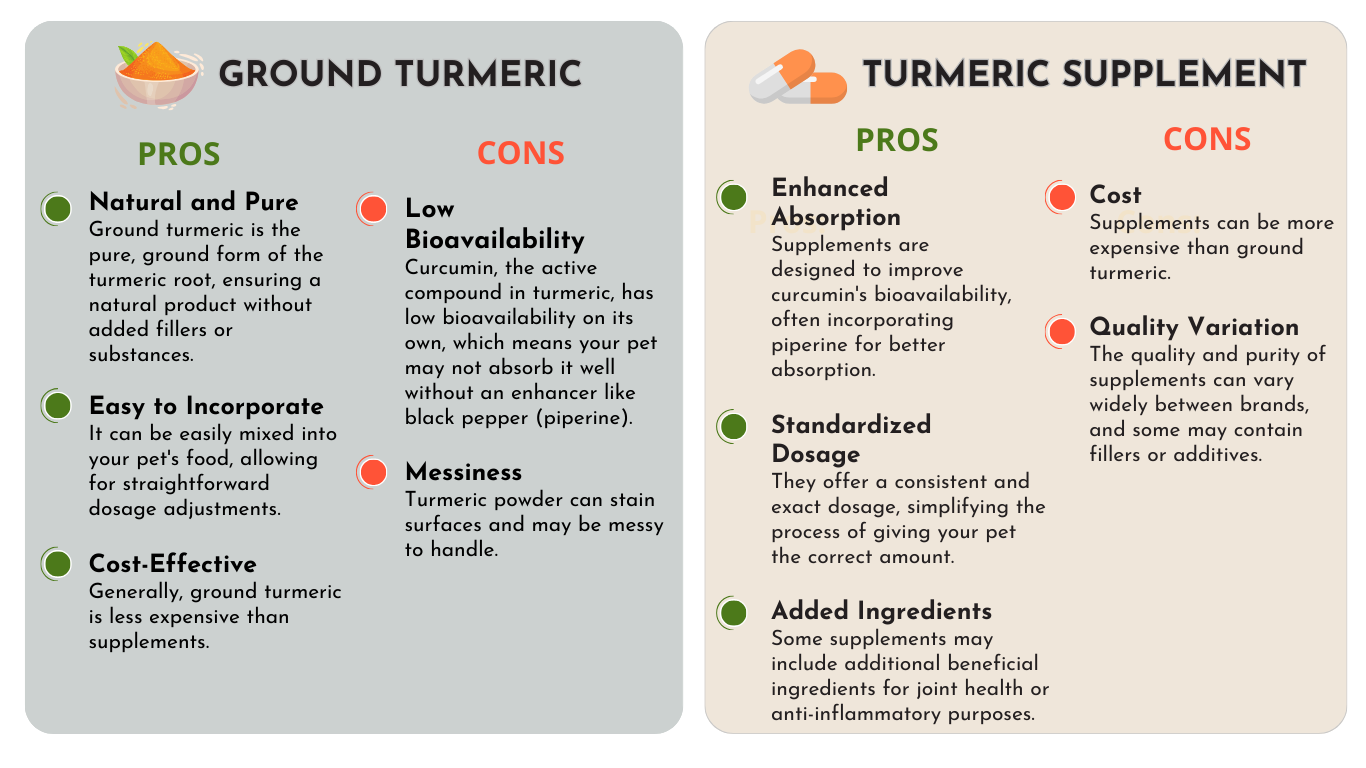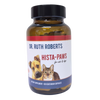Turmeric, the vibrant spice that's taken the health world by storm, is now catching the eyes of pet owners looking for natural ways to boost their pets' health. This spice isn't new; it's been a staple in Ayurvedic and Traditional Chinese Medicine for centuries, celebrated for its distinct color, flavor, and health benefits. Its potential to help with various conditions, from joint pain to cognitive issues, has made it a popular choice among those seeking natural and preventive health measures.
Now, as turmeric becomes more popular, pet owners are left wondering: should they add ground turmeric to their pet's meals, or is a supplement the better choice? Both options have their benefits, and choosing the right one depends on your pet's specific health needs and your wellness goals for them. If you're into natural health remedies or just starting to look into how you can prevent health issues in your pets, this guide will help you figure out the best way to use turmeric to keep your furry friends healthy and happy.
Ground Spice vs. Supplement
The Basics of Ground Turmeric
Ground turmeric comes from the dried root of the Curcuma longa plant, a cornerstone of Indian cuisine known for its robust health benefits. To create ground turmeric, the rhizomes of the plant are harvested, boiled, dried, and then ground into a fine, vibrant yellow-orange powder. This powder is not only a staple spice with a warm, earthy taste and hints of pepper and ginger but also a historical dye, seasoning, and herbal remedy dating back over 5,000 years.
Turmeric Supplements: A Concentrated Boost
Turmeric supplements, on the other hand, offer a potent dose of curcumin—the active ingredient in turmeric known for its health-promoting properties. These supplements emerge from a process that extracts, purifies, and concentrates curcumin, making it more potent than the ground spice. Often combined with black pepper extract to enhance absorption, turmeric supplements are designed to deliver a powerful health punch. They're popular for their potential to ease inflammation, bolster joint health, support digestive wellness, and strengthen the immune system.
Turmeric for Dogs and Cats
Turmeric has gained popularity as a supplement for dogs and cats in the Western world, a trend inspired by its origin in Ayurvedic and Traditional Chinese Medicine (TCVM). In these ancient healing systems, herbs and spices, including turmeric, have been used for centuries to support animal health. In Ayurveda, turmeric is renowned for its anti-inflammatory and antimicrobial properties and is sometimes recommended for various health issues in animals. Similarly, TCVM incorporates various herbs and spices into treatments to help balance the body's energy and promote overall wellness, with turmeric being among those commonly used. While turmeric may not be as extensively studied or widely used for pets in traditional veterinary medicine as it is for humans, its popularity as a supplement for pets is gradually increasing, particularly among pet owners interested in natural remedies and holistic approaches to pet health. Similar to its use in human health, turmeric is sometimes used in pets for its potential anti-inflammatory, antioxidant, and immune-boosting properties.
How Much Turmeric for Dogs and Cats
Understanding the appropriate dosage for turmeric consumption is essential for ensuring its safety and efficacy in pets. Here's a concise guideline for dosing turmeric supplementation for dogs and cats, covering various forms such as turmeric powder, golden paste, and commercially available supplements in the form of capsules/tablets.
Turmeric ground/powder:
- Small Dogs: 1/8 to 1/4 teaspoon per day
- Medium Dogs: 1/4 to 1/2 teaspoon per day
- Large Dogs: 1/2 to 1 teaspoon per day
- Cats: Pinch to 1/8 teaspoon per day
Some pet owners prefer to make a "golden paste" by mixing turmeric powder with a small amount of water, coconut oil, or other ingredients. The rule of thumb is:
- Start with a small amount, such as 1/4 teaspoon per day for small dogs.
- Gradually increase the dosage over several days to avoid gastrointestinal upset.

Turmeric Supplements for Dogs and Cats
Specifically designed turmeric supplements for dogs and cats may provide more standardized dosing and concentration of curcuminoids. These supplements often come in capsule or chewable form, with dosing instructions provided based on the pet's weight. It's essential to follow the manufacturer's recommendations and consult with a veterinarian before administering any supplements to your pet. The general guideline is as follows for turmeric capsules or tablets (97% Pure) - 250mg:
- For pets under 30 lbs: 1 capsule once daily
- For pets weighing 30-60 lbs: 1 capsule twice daily
- For pets weighing 60-90 lbs: 2 capsules twice daily.
Turmeric with Bioperine
Many turmeric supplements now include bioperine to help the body absorb curcumin, the main compound in turmeric. Curcumin isn't easily absorbed by the body on its own. Bioperine, which comes from black pepper, solves this problem by making it easier for curcumin to get into the bloodstream. Bioperine contains piperine, which helps curcumin absorption by stopping certain enzymes from breaking it down. This allows more curcumin to reach the bloodstream intact, maximizing its potential health effects. By including bioperine in turmeric supplements, manufacturers aim to improve the overall effectiveness of the product, ensuring that pets can reap the full benefits of curcumin's therapeutic properties.
Turmeric and Coconut Oil
Another option is supplements that contain turmeric and coconut oil. As mentioned above, turmeric and coconut oil can complement each other. Coconut oil, being a source of healthy fats, aids in the absorption of curcumin, as it is a lipophilic compound, meaning it dissolves in fat. Therefore, combining turmeric with bioperine and coconut oil helps ensure that more curcumin is absorbed by the body, maximizing its potential health benefits.
Conclusion
The increasing popularity of turmeric supplements for pets underscores a growing interest in natural health solutions. Whether opting for ground turmeric or turmeric supplements, pet parents should prioritize the potential benefits of curcumin, the active ingredient. While ground turmeric offers a familiar choice, supplements, especially those containing Bioperine and coconut oil, provide a concentrated and potentially more effective option. By carefully considering factors like product quality, dosage, and individual health needs, pet owners can make informed decisions to support their furry friends' well-being. As turmeric continues to gain attention as a versatile supplement, further research is needed to unlock its full potential for both pets and their human companions.















